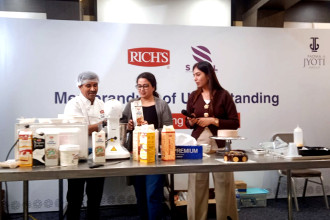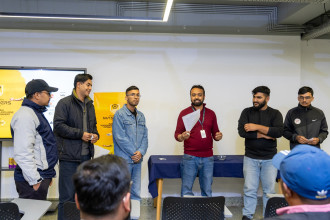KATHMANDU: WOW Magazine hosted an event in Kathmandu on Sunday featuring Swami Vigyananand, who discussed feminism, female leadership and economic empowerment through the lens of Hindu philosophy.
Swami Vigyananand, an IIT alumnus and Sanskrit scholar, serves as joint general secretary of Vishva Hindu Parishad, founder and global chairman of World Hindu Foundation, and chief organiser of World Hindu Congress. His book, The Hindu Manifesto, launched recently, outlines eight guiding sutras for civilisational renewal, drawn from texts including the Vedas, Ramayana, Mahabharata, Arthashastra and Shukranitisar.
The session opened with Media9 editor Charu Chadha citing stark global statistics on gender injustice: daily intra-family killings of women; about 800 maternal deaths; 270 million women without access to modern contraception; over 12,000 girls at risk of genital mutilation each day; Iran’s legal marriage age of nine; Afghan girls barred from secondary education; and 60 million schoolgirls experiencing sexual assault. She also noted US restrictions on transgender identity under the Trump administration, emphasising the contradiction between India’s veneration of goddesses and the persistent discrimination women face at home.
Amuda Mishra, founder and executive director of Ujyalo Foundation, said that Hindu goddesses—from Durga’s resistance to Saraswati’s wisdom—provide leadership models that have been domesticated by centuries of patriarchal reinterpretation. She called for justice over ritual, recognition of unpaid care work, gender justice alongside climate justice and a reclaiming of community power so that women can lead from “kitchens, temples, rice fields, classrooms and the front line.”
Swami Vigyananand then urged a return to Hinduism’s primary texts to recover their original vision of empowerment. He summarised his eight sutras into modern governance principles: economic prosperity as a sacred duty; robust defence underpinned by a strong economy; practical, income-generating education with rigorous assessment; and democratic accountability under Abhishek Loka Tantra Divya. He said respect for women is the highest civilisational criterion and urged a non-discriminatory, caste-free society, citing King Santanu’s cross-social marriage in the Mahabharata and noting that varṇa originally denoted vocation rather than birth status.
In an interactive Q&A, Vidushi Rana, executive director of Gold Star, asked whether menstrual taboos are scripturally mandated or socially constructed. Swami Vigyananand replied that Hindu tradition regards menstruation as a natural period of rest. On men’s roles in gender equity, he said scriptures endorse shared domestic duties. Politician Hisila Yami added that spiritual practice remains a deeply personal matter.
The event concluded with participants recognising the need to acknowledge personal privilege and extend support to marginalised groups.
READ ALSO:






